TBI Treatments
Integrative Care for Concussion / Traumatic Brain Injury Sufferers
in Ft. Lauderdale & Tampa, Florida
Revolutionize Your Recovery: Unleash the Potential of TBI Treatment
Did you know that left untreated, concussions reduce your quality of living for the rest of your life? Mental illness and other conditions such as Alzheimer’s are now being linked to mild traumatic brain injuries (TBI) such as concussions.

Comprehensive TBI Treatment: Empowering Healing & Rehabilitation
The Power of Healing: Top TBI Treatment Strategies for a Successful Recovery
Traumatic brain injury (TBI) is a serious medical condition that can have long-lasting effects on a person’s physical, cognitive, and emotional health. Treatment for TBI varies depending on the severity of the injury and the specific symptoms that the individual is experiencing.
Even after all symptoms of a concussion seem to be gone, injury to soft tissue, blood vessels, and nerves in the brain may cause long-term problems. This is why any noticeable concussion symptoms should be treated by knowledgeable neurology experts.
The length of your treatment time will depend on the severity of your injury, the symptoms you experience, and your progress, while undergoing therapy. Contact our team today to schedule a consultation.
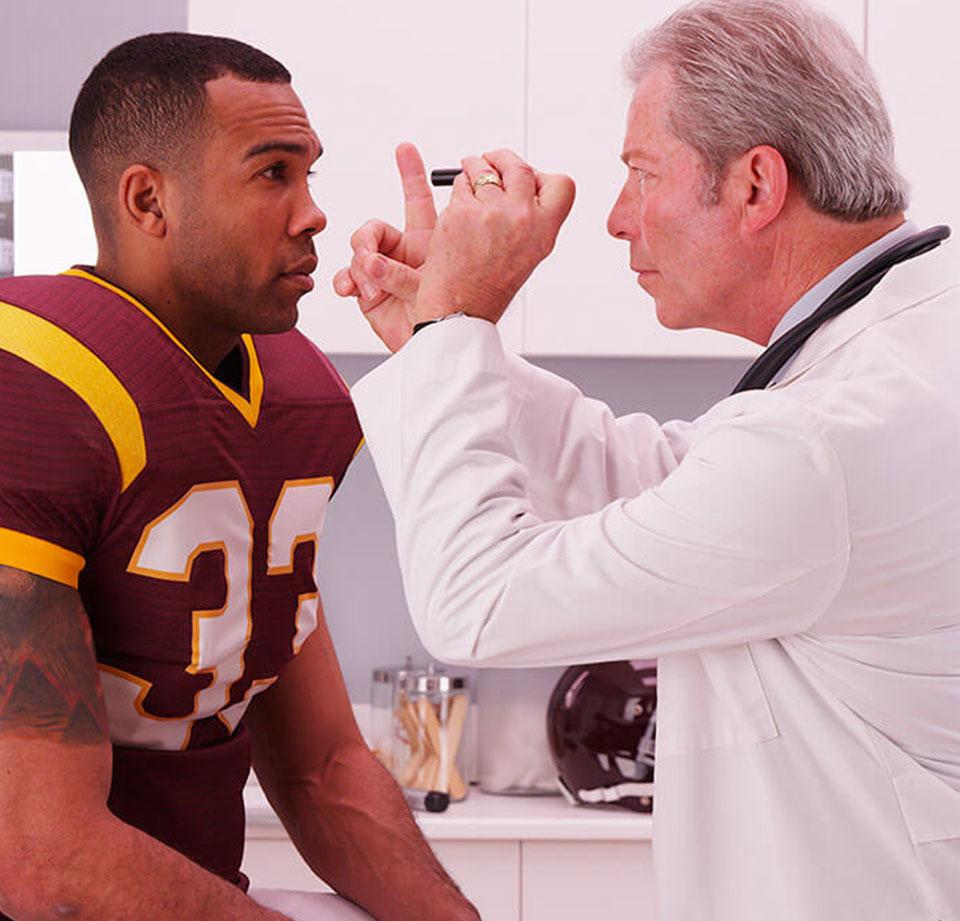
Transforming Lives: The Best TBI Treatment for Optimal Recovery
The Power of Healing: Top TBI Treatment Strategies for a Successful Recovery
What are the treatments for traumatic brain injury (TBI)?
The treatment for traumatic brain injury (TBI) varies depending on the severity of the injury and the specific symptoms and needs of the individual. It typically involves a combination of medical interventions, rehabilitation therapies, and supportive care. Here are some common treatments for TBI:
Emergency Medical Care: In severe cases of TBI, immediate medical attention is required to stabilize the patient’s condition. This may involve surgery to remove hematomas or repair skull fractures.
- Rest and Monitoring: In the immediate aftermath of a TBI, rest and close monitoring is often recommended to ensure the injury does not worsen. This can include avoiding physical activity and minimizing exposure to screens and bright lights. Rest and monitoring are essential for healing the brain and preventing further damage.
Medications: Medications can manage various TBI symptoms, including headaches, seizures, and depression. Non-steroidal anti-inflammatory drugs (NSAIDs) are often used to manage pain and inflammation, while antidepressants and anti-anxiety medications can treat mood disorders. Anticonvulsants are used to control seizures.
Rehabilitation Therapies:
- Physical Therapy: Physical therapists work with individuals to improve mobility, coordination, balance, and strength.
- Occupational Therapy: Occupational therapists help patients regain skills necessary for daily activities, such as dressing, eating, and personal care.
- Speech and Language Therapy: Speech-language pathologists assist with communication difficulties, swallowing problems, and cognitive-linguistic impairments.
- Cognitive Rehabilitation: This focuses on improving cognitive functions, such as memory, attention, problem-solving, and executive functioning.
- Vocational Rehabilitation: Vocational specialists help individuals with TBI reintegrate into the workforce by providing job training and support.
Behavioral and Psychological Interventions: Counseling, psychotherapy, and behavioral interventions are crucial for addressing TBI’s emotional and psychological challenges. These therapies help individuals manage depression, anxiety, anger, and adjustment difficulties. They also provide coping strategies, stress management techniques, and support for emotional well-being.
- Assistive Devices: Depending on the specific impairments resulting from TBI, assistive devices such as mobility aids, communication devices, and adaptive equipment may be recommended to enhance independence and quality of life.
Surgery: In some cases, surgery may be necessary to repair brain damage or relieve pressure on the brain caused by swelling. This is typically reserved for more severe cases of TBI.
- Supportive Care: TBI patients often require ongoing support and care. This may include assistance with activities of daily living, emotional support from family and friends, support groups, and community resources.
It’s important to note that the effectiveness of TBI treatment can vary depending on the severity of the injury and the specific symptoms the individual is experiencing. However, with proper treatment and management, individuals with TBI can often see significant improvement in their symptoms and quality of life.
From Diagnosis to Recovery: Unveiling the Journey of TBI Treatment
At Radius TBI, our neurology, neuro-ophthalmology, neuropsychology, audiology, psychology, and physical therapy offer options for treating concussion and TBI in the Ft. Lauderdale & Tampa, Florida area. We aim to help heal the brain and manage emotional issues arising from TBI.
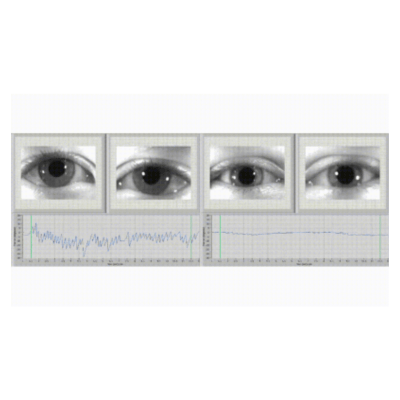
Vision Therapy
Don’t let vision problems affect your daily life. Our Neuro-Ophthalmology uses the highest level of care for your visual health and can diagnose and treat complex visual disorders related to the brain and nervous system, such as double vision, optic nerve disorders, and visual field defects.

Psychological Counseling
To manage stress disorders stemming from concussions, we provide psychological counseling, which helps patients overcome anxiety, irritability, and mood swings post-injury, and improve general emotional well-being.
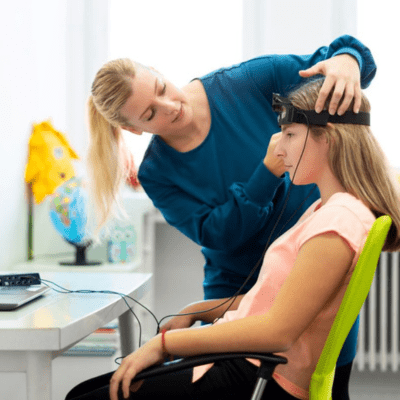
Neurofeedback
Neurotherapy, or neurofeedback, teaches patients how to self-regulate brain function. This cutting-edge biofeedback technique monitors heart rate, blood pressure, skin temperature, and brain waves. It then uses those to help you gain control over these processes through conditioning.
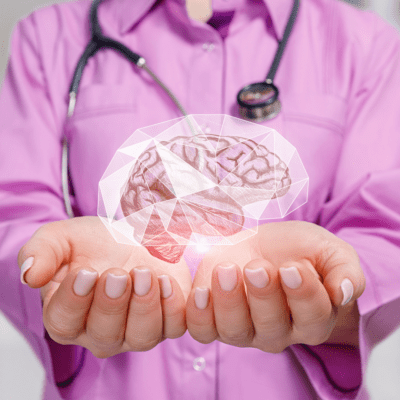
Neurocognitive Rehabilitation
Our state-of-the-art visual neuro-cognitive rehabilitation device assists in treating patients suffering from reduced motor skills, reaction time, cognitive function, and poor balance.
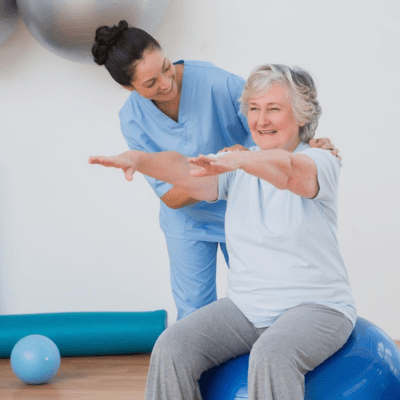
Physical Therapy
We provide physical and occupational therapy to build physical strength, balance, and flexibility, including vestibular balance training to restore balance, eliminate dizziness, and improve endurance and to help restore energy levels.

Nutrition Counseling
We may also add alternative treatments, including nutrition counseling and acupuncture, to improve patient outcomes.
The length of your treatment time will depend on the severity of your injury, the symptoms you experience, and your progress while undergoing therapy. Contact our team today to schedule a consultation.
DID YOU KNOW?
TBI is a major cause of death and life-long disability in the United States. (including all levels of severity)
- An estimated 1.5 million Americans sustain a TBI (Sosin, Sniezek and Thurman 1996);
- 50,000 die from these injuries; and 80,000 to 90,000 experience onset of long-term disability (CDC 1999).
- An estimated 5.3 million Americans live with a permanent TBI-related disability today (CDC 1999).
According to the report to Congress on mild traumatic brain injury in the United States. Centers for Disease Control and Prevention; 2003. https://www.cdc.gov/traumaticbraininjury


